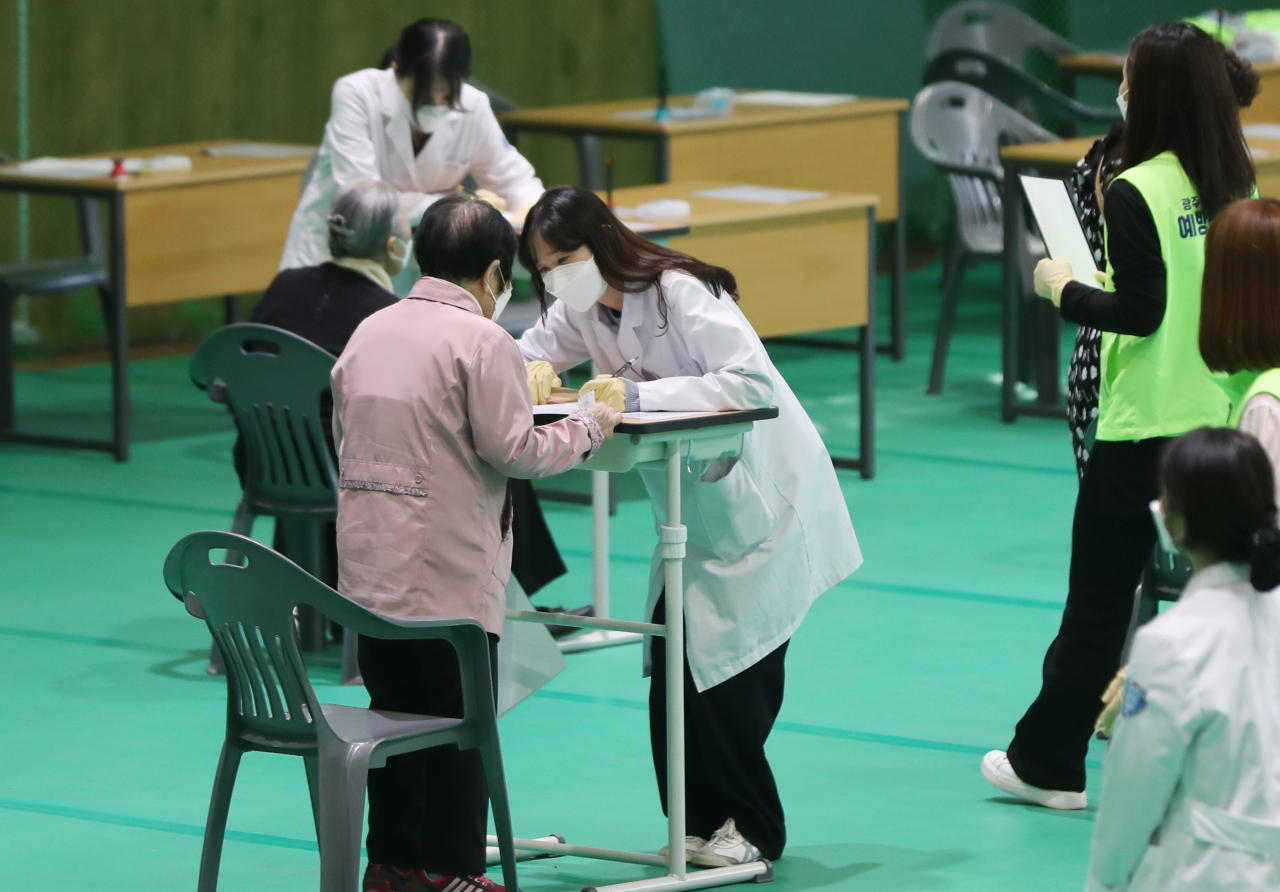South Korea’s national health agency once again put off announcing a case of a serious adverse event following COVID-19 vaccination, inviting concerns that it may mar public trust in the program.
The latest case, the report of which was filed with the agency as early as April 9, went unaddressed until after a press leak Tuesday evening forced the disclosure.
According to officials in Hadong, South Gyeongsang Province, a previously healthy civil servant was taken to the hospital on April 6 with a severe headache and numbness in the arms and legs. The man, who received his first AstraZeneca shot on March 16, suffered a brain hemorrhage and had to undergo emergency surgery. He is still recovering in the hospital.
This marks another case of severe complications post-vaccination among young recipients here that were not shared publicly for at least two to three weeks since the report was submitted. The agency publishes all reports of vaccine adverse events daily on its website.
In response to The Korea Herald’s inquiry, the Korea Disease Control and Prevention Agency said in Thursday’s news briefing that the case of the civil servant appeared to be “different from the rare blood clotting condition that is being looked into by regulators,” discounting the possibility of a connection to the vaccine.
Park Young-joon, who is heading the agency’s monitoring team on adverse events following immunization, said at this point his diagnosis was unclear, and that “abnormal blood vessels in the brain” were the suspected cause.
The agency previously said unusual blood disorders linked to the AstraZeneca vaccine could occur four to 28 days after inoculation.
Aside from the latest case of the civil servant in Hadong, the agency announced at least three cases of AstraZeneca vaccine recipients in their 20s affected with atypical blood disorders. None of them had prior medical problems.
The first case that emerged in mid-March was a paramedic who developed cerebral venous sinus thrombosis, or severe blood clotting in the brain. The other two involved front-line health care workers who came down with pulmonary embolism, or blockage in lung arteries, accompanied by deep vein thrombosis, or clots in a leg vein.
Health authorities do not deem any of them to be associated with the vaccine. If a link between reported adverse events and vaccination is not established, medical expenses are not compensated by the government.
As the vaccine rollout reaches the wider public, calls are growing for ways to compensate people suffering from suspected vaccine injuries.
In a petition posted Tuesday on the presidential website, the husband of a nursing assistant in her 40s who was paralyzed in all four limbs after an AstraZeneca shot claimed the treatment was costing the couple over 4 million won ($3,600) a week. He said the causality assessment was set to take three months, requesting support from the government.
In response to the highly publicized post, the Ministry of Health and Welfare said in response to a reporter’s question during Thursday’s closed-door briefing that the nursing assistant could be at least partially compensated through the existing welfare program.
The nursing assistant, 45, came down with a serious neurological complication that left her unable to move her arms or legs roughly three weeks following her inoculation, according to the latest government report.
She was diagnosed with acute disseminated encephalomyelitis -- a sudden and widespread inflammation in the brain and spinal cord -- or ADEM, on March 19. Her early symptoms included a persistent headache, blurred vision and a fever that peaked at 38 degrees Celsius.
The International Vaccine Institute’s Director General Dr. Jerome H. Kim said there were no documents that directly suggest ADEM as a possible vaccine side effect.
“You would expect to see a certain rate of occurrence in the population as a whole. I have not seen a flag raised by other regulatory agencies as they had with CVT (clotting in the brain) as occurrence over background -- and it also occurs prominently in COVID-19.”
That being said, he added all potential vaccine-related events “should be followed up and reported, and how these relate to vaccination has to be carefully studied.”
In Korea, all of the five reported cases of blood disorders suspected of association with the AstraZeneca vaccine have been in relatively young people in their 20s to 50s. Some experts suggest raising the vaccine’s age restriction, which is currently set at 30, as a precaution.
Dr. Ma Sang-hyuk, the Korean Vaccine Society’s vice president, said given the low rates of vaccination for older groups in Korea, for whom vaccinations began just three weeks ago, changing the age recommendations was probably justified.
“Most cases observed in countries with wide AstraZeneca vaccinations were in people aged 60 or under. The benefit-risk balance remains obscure for younger people,” he said.
By Kim Arin (
arin@heraldcorp.com)





![[Exclusive] Hyundai Mobis eyes closer ties with BYD](http://res.heraldm.com/phpwas/restmb_idxmake.php?idx=644&simg=/content/image/2024/11/25/20241125050044_0.jpg)
![[Herald Review] 'Gangnam B-Side' combines social realism with masterful suspense, performance](http://res.heraldm.com/phpwas/restmb_idxmake.php?idx=644&simg=/content/image/2024/11/25/20241125050072_0.jpg)

